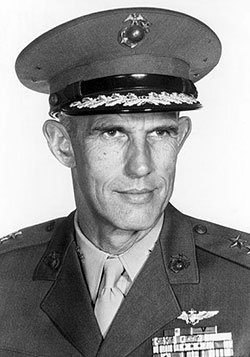Marion E. Carl
Navy Cross with Gold Star (two awards of the Navy Cross)
Major General Carl, born in Hubbard, Oregon, is the U.S. Marine Corps’ first air ace. His impressive military career spanned 35 years as a veteran of World War II, the Korean War and the Vietnam War. In World War II, Carl scored a total of 18 aerial victories.
Carl earned his first Navy Cross for extraordinary heroism in aerial combat as a section leader of a Marine fighter squadron in the Battle of Midway. Later, at Guadalcanal, he earned his second Navy Cross, and became the first U.S. Marine ace on August 26, 1942. After World War II, Carl became a test pilot and commenced to achieve a long list of firsts: he made some of the first aircraft carrier take offs and landings in the F-80 Shooting Star; he was the first Marine helicopter pilot; he set a world speed record and an unofficial world altitude record. Numerous assignments and promotions later, Carl also commanded the first Marine fighter jet unit and created the first jet aerobatic team. Carl retired on June 1, 1973 with the rank of Major General. He was tragically killed on June 28, 1998 during a robbery at his home in Roseburg, Oregon.
Major General Carl’s military medals include: Navy Cross with gold star; Legion of Merit with Combat “V” and gold stars in lieu of second through fourth awards; Distinguished Flying Cross with four gold stars; Air Medal with two silver stars and three gold stars; Presidential Unit Citation with one bronze star; American Defense Service Medal with Base Clasp; Asiatic-Pacific Campaign Medal with three bronze stars; American Campaign Medal; World War II Victory Medal; National Defense Service Medal with one bronze star; Vietnam Service Medal; and the Republic of Vietnam Campaign Medal.

